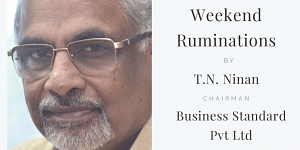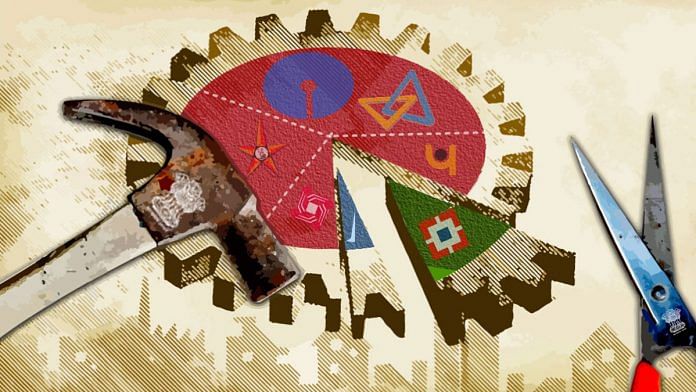Half a century after the nationalisation of 14 banks (all those with deposits in 1969 of more than Rs 50 crore), many commentators have been debating whether it was a good or bad thing that Indira Gandhi did. That’s the wrong question, but its short answer is that it was both good and bad. It helped spread the banks’ footprint and boosted the national savings rate, but it has cost the taxpayer a pretty penny because of these banks’ constant need for fresh capital. Nor is Indira Gandhi’s motive behind nationalisation a relevant question waiting to be settled. Everyone knows it was done for collateral political reasons, but even undisguised populism can have beneficial results. The right question to ask today is, what now?
 The starting point has to be that the government-owned banks have a problem. Their lending record is much worse than for the banking system as a whole, they have been left behind in the technological transformation that has overtaken banking, and they remain less customer-focused than their better-run private sector counterparts. Even retail depositors have begun taking their money to the private banks. Losing the retail franchise could be the kiss of death.
The starting point has to be that the government-owned banks have a problem. Their lending record is much worse than for the banking system as a whole, they have been left behind in the technological transformation that has overtaken banking, and they remain less customer-focused than their better-run private sector counterparts. Even retail depositors have begun taking their money to the private banks. Losing the retail franchise could be the kiss of death.
But privatisation remains a political no-no, and in any case is not an across-the-board solution. For while private lenders like HDFC Bank have done astonishingly well, there have been failures too. The near-collapse of YES Bank’s share price and its desperate need for fresh capital point to some of what used to go on with private banks before nationalisation. Similarly, the defaults by large shadow banks like IL&FS and DHFL, with others perhaps waiting to hit the headlines, are no advertisement for private ownership of financial entities.
That said, the government’s solutions so far have not measured up. Providing repeated rounds of fresh capital without taking steps to improve performance is not very different from pouring money into a bottomless pit. And it is not clear that the Reserve Bank of India (RBI) has looked hard enough at its own supervisory processes, which allowed the mess to reach the scale that it has. The solution has to come from elsewhere.
Look, therefore, at what happened in telecom and aviation. The legacy players were left to stew in their own juice while new private players took away the market. No company got privatised, the sector did. Many new private entrants did not survive the competition and folded up (capitalism at work), while the government continues to own and fund the legacy players (state capitalism at work). By the time the government throws its hand in and finally decides to sell, there is usually precious little on offer for prospective buyers.
The banking sector is getting privatised. Just five years ago, the government’s banks used to have deposits and advances that were four times those of the private Indian banks. Now the multiple is just 2.2 for deposits and 1.8 for loans. When it comes to incremental deposits and advances, the tables have been turned dramatically. Last year, the private banks took in and lent out money on a scale of two to three times what the government banks did. If private banks hold on to their role as growth drivers, it won’t be long before they in their totality become as big as the government banks, and then take over the sector.
Meanwhile, it has been true for some time that the most valuable private bank is worth much more than the largest government bank, State Bank of India. The rest of the government banks put together are worth only about as much as a private bank that wasn’t yet born in 1991. That’s because investors have made their preferences clear: Good private banks are quoting at steadily higher multiples of book value, while the government ones are at embarrassing discounts to book value.
It is not enough for the government to let this process continue to its logical conclusion, because banks are more important than airlines and telecom companies. Whether through merger, selective sale, or by enforcing narrow banking restrictions on weak players, it must deliver a financial sector where health is not determined by ownership.
By Special Arrangement with Business Standard
Also read: Shadow banking crisis, trade disputes & cut in govt spending could jeopardise profit margins
Disclosure: Entities controlled by the Kotak family have a significant shareholding in Business Standard.




The author wants the banks to be privatised but is unwilling or hesitant to take a call in black and white . Every government owned bank is doing badly in comparison with the private ones , if that is not conclusive , what will be conclusive ? The author points to problems in private sector banks like Yes bank , DHFL and some have pointed to the banking crisis in the US to point out deficiencies even in the private sector . It is nobodys case that privatization is perfect , it is not , it is much better than government ownership . The amount of taxpayer money that must and is being piifered in Public Sector Banks must be humungous and Chanda Kochar got the sack for diverting peanuts . So there rests the case for privatization .
I beg to differ slightly with the views presented in the article. There have been failures in the private sector too. If you take Aviation industry, Kingfisher and Jet are very big failures. In the telecom sector, Reliance(ADAG) and even Tatas have not not done well. In the lending business failures have been galore. Failure of Global Trust Bank is a prominent example. It’s recent incarnation is Axis Bank, which is undoubtedly a strong private sector bank. But here too rather sudden exit of its ex-MD Shikha Sharma was witnessed. Chanda Kochhar, ex-MD of ICICI Bank is facing CBI investigation. Yes Bank is in trouble so are NBFC lenders IL&FS and DHFL. Failure of the banking system in USA was witnessed in 2008 and American government had to come forward to bail them out. Thus ownership is not the issue. Nor are the norms for priority sector landings. The fault line is about lending to big corporates and funding big ticket projects. The earlier system of Term Lending Institutions has lapsed and at around two decades ago, PSU banks and some Pvt Sector banks have replaced them. Funding long term loan assets with short term funds had created many issues. Failure of big ticket projects and corporates is the reason for massive accumulation in NPAs. Those private sector banks who restricted to retail lending are doing fine. Hence, the fundamental issue is not who should own banks but who should fund long term big ticket projects and how. We had no answer to this two decades ago, nor do we have a viable remedy now. Until such time we devise an institutional framework to address this issue, the crisis will continue.
Who will let go of Alladin’s magic lamp … This Jersey cow is now running seriously short of milk. Selling PSBs was the right thing to do in 2014, as it does in 2019. We can put off the agony for some more time, at cost to the fisc and even more to the economic revival India so desperately needs. Mrs Gandhi’s economic orthodoxy, wrapped in a fancy saffron shawl, is not what India needs. Because the reforms of 1991 were not built upon and deepened / broadened, India has continued to lag its true potential, falling ever further behind its principal competitor and adversary. However, we have not seen the wheels coming off, as now seems to be happening. If India needs a crisis to reform, that warmth is building in the fireplace. Privatisation of banks will be one of many long delayed reforms that will be forced upon a India by the sheer force of circumstances. With such a dazzling mandate, we should be driving desired change instead of merely responding out of compulsion.
Agreed.